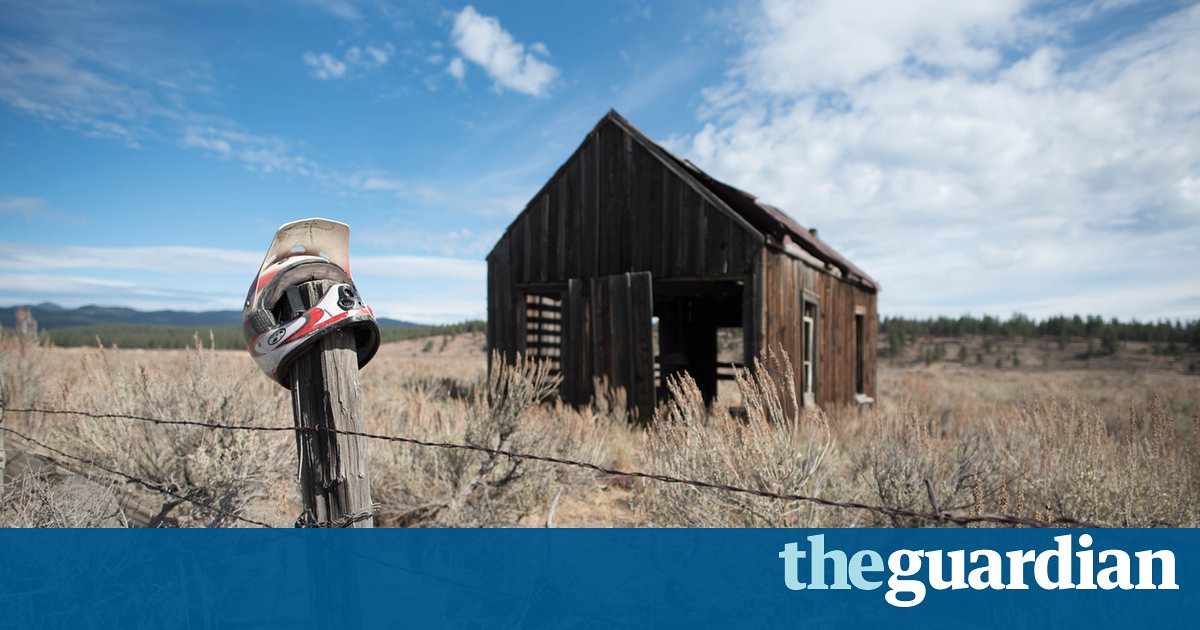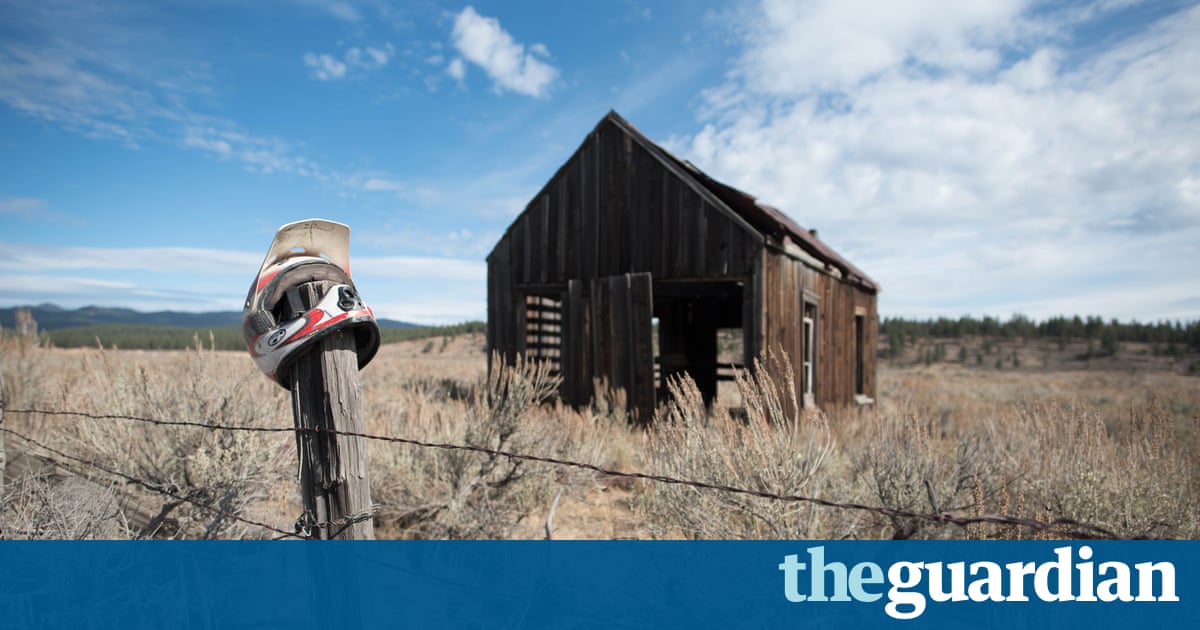Extremist militias recruiting in fear of Clinton winning election, activists say

Extremist surge got national attention during the Oregon militia standoff and has continued to rise with Trump, with his legitimization of white nationalist politics

In the past 12 months, Jessica Campbell has had her cars fuel line cut and its wheel nuts loosened. Late last year, she had a GPS tracker surreptitiously attached to her vehicle. She is now accustomed to being tailed by unfamiliar vehicles on Interstate 5 near her home in Cottage Grove, just outside Eugene, Oregon. Strangers have regularly come uninvited onto her property; someone even stripped the barbed wire on her fence just to send a message. Online, she has repeatedly been threatened with rape and death.
And last week, when she showed up at the Canyon City community hall in Grant County, she told me that someone shot at her and her entourage. They misread their GPS, took a wrong turn and stopped to get their bearings when a crack rang out with what Campbell thought was a .22 bullet whizzing by their vehicle.
Such threats are part of the pushback her work has sparked in rural Oregon.
Campbell co-directs the Rural Organizing Project, a not-for-profit group that sets out to confront the rightwing insurgency that has been bubbling away in parts of rural Oregon and throughout the west. A political organizer since high school, she now coordinates groups attempting to respond to divisive tactics from rightwing activists on immigration, race and public land ownership.

This extremist surge received national media attention during the occupation of the Malheur national wildlife refuge by the Bundy group, but it has continued to rise alongside Trump, with his legitimization of white nationalist politics and his apparent inspiration of insurrectionists across the country.
The Patriot movement is an overarching description for a range of anti-government groups from organised militia groups to tax protesters and so-called sovereign citizens. They have burgeoned during the Obama years and have carried out actions, such as the occupation of a wildlife refuge to border patrols in Arizona.
This year, Patriot members have run for office in rural counties, and at least one militia leader, Joseph Rice, attended the Republican national convention to cast his vote for the Donald Trump. Some sheriffs, such as Glenn Palmer in Grant County, have clear sympathies and links with the movement.
Elsewhere, according to Campbell, Patriot sympathizers are moving into communities in order to tip the electoral balance towards far-right candidates. She fears this trend will continue long after a Trump defeat. Im seeing a lot of paramilitary groups recruiting on the basis of a likely Hillary Clinton win, she said.
When Trump started talking about rigged elections and how a Clinton win would show that democracy was broken, it was just amazing seeing how that resonated with people a sense of democracy being broken, feeling like the candidates dont represent them or anything they want to see happen in this country, she added.
Campbell would vastly prefer that Clinton wins but acknowledges that it may be like it was after Obama won, where there was a huge growth in Patriot movement organizing. Im worried that we are going to see the same thing. The alleged bomb plot by militia members in Kansas, timed for the day after the election, shows the way in which those fears might be borne out.
The Rural Organizing Project is not waiting idly for this tide to roll in. The group has just finished a statewide tour in which they presented a report on the growth of the Patriot movement, which they collaborated on with Political Research Associates, a thinktank that watches the far right.
Instead of inviting people to view it online, Campbell and her colleagues went to eight rural towns and delivered the main points in a series of lectures. The tour finished late last week.
Each event followed a pattern developed through long experience confronting those who would prefer that progressive voices arent heard. At each stop, after Campbells brief Powerpoint summary of Patriot movement organizing in Oregon, they invite written comments that are then read out. In Bend, one question asked about the impact of Patriot movement organizing on tourism; in Canyon City, people wanted to know about the economic roots of the far-right insurgency. Small-group discussions follow. The format is designed to de-escalate the tension that has increasingly riven small-town politics in Oregon, and to minimize opportunities for disruption.

Campbell and her crew also travel with a highly visible security detail, partly made up of Portland members of the All African Peoples Revolutionary Party. Earlier this year, attendees of a workshop were harassed in the carpark outside the event, and they decided that positive, protective steps were needed.
The events are hosted by local progressive organising groups, and at the largest events, such as the one in Canyon City in Grant County, 50 to 60 people showed up a large number in a county of about 7,000 residents. Although many who come represent the active, progressive minority in small towns, resistance to the militia movement has a way of binding people together who may disagree on a range of issues. Campbell says that the Grant County group features people from across the political spectrum who share a concern about who is directing county politics.
These numbers underscore something Campbell stresses: while media reports often suggest that patriots and the far right are representative of community opinion, they are frequently no more than a vocal minority. ROPs presence encourages those who disagree to the far rights prescriptions to rise above the intimidation they use to silence their opponents.
There were clear signs that their strategy which for now Campbell calls an experiment is working to empower locals, and even open up a dialogue with those who have been drawn into the orbit of the far right.
In Canyon City last January, Judy Schuette heard about the plans of militia members to meet in Grant County and perhaps spread the occupation there. Schuette called for a response and a public meeting on Facebook. On the floorboards of the community hall, she recalls: I didnt know how many people would show up, and we wound up with about 70 people.
After being formally organised in February, the group carried out several actions. They visited Harney County to show support for a protest there, and attended meetings of the county court, the local governing council, to protest increasing militia and Patriot disruption of the body.
But ROPs tour doesnt just let them put on another big public gathering. Activists also get de-escalation training from the security detail and much-needed information about how to fight and win a long-term campaign against the rightwing insurgency in their community.

For Campbell, local organisers like Schuette are the prime movers for making change in rural Oregon.
Theyre incredibly dedicated and brilliant. Theyre mostly women who care about their community. In Grant County and other counties where people are feeling that their lives could be on the line if they dont act now, thats where people are doing the best work.
But Campbell is clear-eyed about the roots of the problem, and her diagnosis cuts through a lot of the armchair debate about where the resentment that underpins rightwing insurgency comes from. In rural areas the conditions have been ripe for a white nationalist populist movement. Especially in Oregon where were facing demographic shifts in a lot of places, and the economys hurting so badly, and weve had decades of scapegoating of people of colour as the reason why our economies are so bad.
In some Oregon counties, as in other rural areas, libraries are shutting, and sheriffs departments cant provide 911 dispatch after dark. Dwindling services lead to a sense of abandonment. The right can easily step in and provide both a clear political narrative to explain this, and a set of simple-seeming solutions.
The Patriot movement is attracting people who feel disenfranchised. Its real out here, where people feel like they have not been listened to at the state level, and particularly by Democrats, Campbell says.
The same dynamic has been driving the election. The appeal of both Donald Trump and Bernie Sanders was that they didnt feel like establishment figureheads. It didnt feel like they were going to uphold the status quo.
Democrats, who hold a rare trifecta of both state houses and the governorship, see no point in outreach to deep red counties in the east and south of the state. Its been pretty clear that rural Oregon has been written off. Were often the only game in town.
The focus of the tour might be the militia movement, but the real goal is addressing this sense of lost political agency.
Our goal isnt to take down the Patriot movement. Its to build a rural Oregon where people have some access to democracy and are able to create change and have an impact on their communities.
Helping these communities to demand the resources they need to shut down rightwing insurgencies means having a conversation with them, and not simply dismissing or scapegoating them. It also requires bravery: if you confront the far right on their own turf, you might be threatened, followed or shot at.
We havent all been given as big a share of courage as Campbell, the rest of the ROP, and local organizers have. But we can at least listen to what they have to say about the origins of Americas rightwing surge.